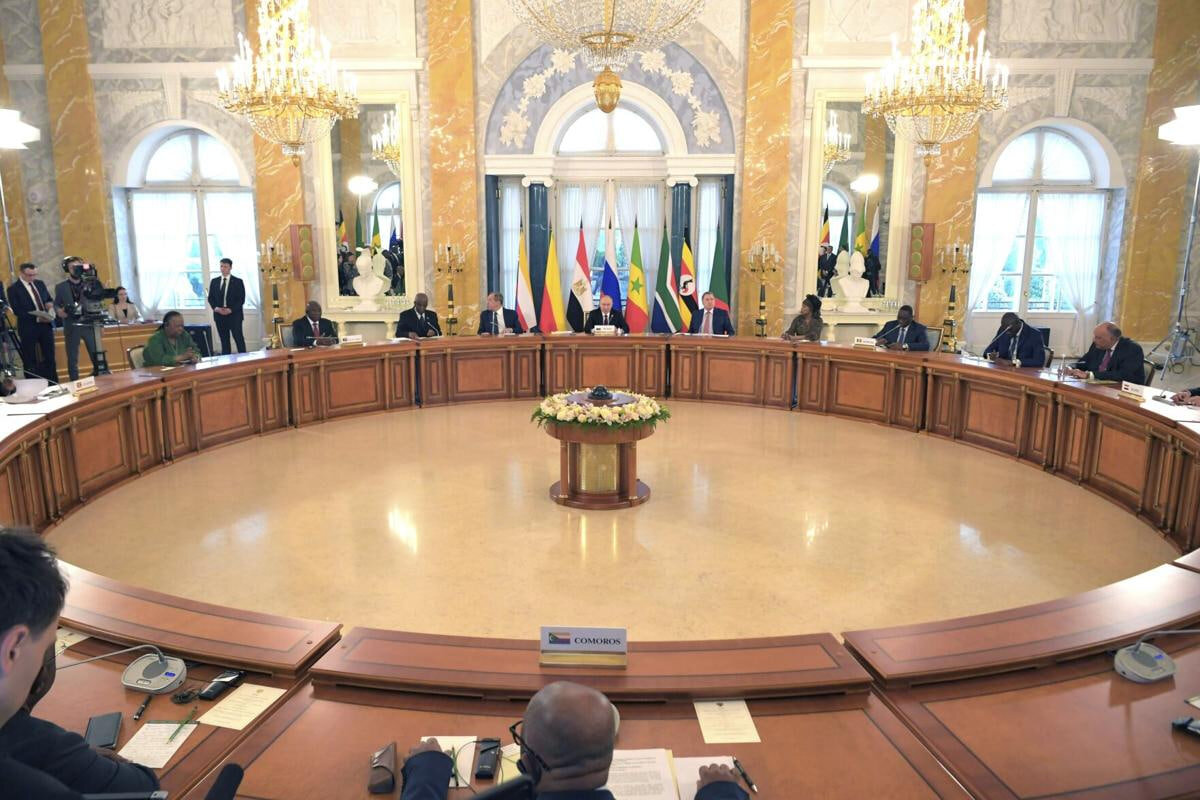Why do Africa's talks with Putin matter?

TEHRAN- Africa has become part of the global effort to end the Ukraine war.
A team of African leaders has held talks with the Russian President in a bid to end the Ukraine conflict, showing the global ramifications of how a war in Ukraine can trigger devastation back in Africa.
The fact that Africa is now trying to settle a conflict in Eastern Europe speaks volumes.
Russian President Vladimir Putin hosted the large delegation of African leaders in St Petersburg to discuss ways of ending the Ukraine crisis.
During the meeting, Putin welcomed the delegations' "balanced approach" to the conflict and reiterated that Russia has never refused to negotiate for peace.
He said that peace negotiations have been rejected by Ukraine and NATO, who refuse to enter talks.
The African delegation comprised of South African President Cyril Ramaphosa, Senegalese President Macky Sall, Comoros President Othman Ghazali, Zambian President Hakainde Hichilema, Egyptian Prime Minister Mostafa Madbouly, and senior officials from the Republic of Congo and Uganda.
This is significant as it highlights how far-reaching and dangerous the conflict has become for the African continent.
China has already tried to end the fighting, Iran has done the same, Brazilian President Lula da Silva made an attempt recently, as have many other third parties, with the exception of the U.S.-led NATO military alliance and its allies (apart from Turkey).
The war has impacted economies around the world, but Africa has the most to suffer as it is reeling from the repercussions of the conflict.
Before the war erupted, Africa relied heavily on food and energy from both Russia and Ukraine.
Following the eruption of the conflict that began in February 2021, the import of grain, a vital commodity for Africa in particular, was put on hold.
Supplies resumed via the Black Sea under a UN deal that has been extended in May this year for two more months until July 17.
However African countries are complaining that the majority of the grain, under the UN-mediated deal, is heading to Western countries and that Africa, where grain is needed the most, is not getting its fair share.
This was highlighted by Putin in his remarks with the African delegation.
"As of June 15, 31.7 million tons of agricultural produce were exported from Ukrainian ports, while 976 thousand tons – or 3.1% – were sent to the African countries in the most need," Putin said.
As a result, this has caused food prices in Africa to rise in a region where there is already a lot of people who live in poverty.
This is dangerous as there are already conflicts in Africa, and when the level of hunger rises, it brings the possibility of triggering further fighting in this volatile region of the world.
During the talks with Putin, African leaders pointed out that the war between Russia and Ukraine has heavily impacted the whole African continent, creating unprecedented threats to food and energy security.
African leaders perhaps know that their proposals for reaching peace will not materialize. But they are making it clear that whatever happens outside Africa has a direct effect inside Africa.
The African delegation had earlier visited Ukraine as well, presenting the same peace plan to the leaders of both countries in a bid to end the conflict, which shows no signs of ending.
The African peace initiative calls for all the restrictions on trade in grain and other goods to be immediately lifted, while those affected by the conflict to be provided with humanitarian support.
The African delegation's hopes of mediating an end to the war appear to have hit a brick wall, the same brick wall that was hit by other parties that had tried to settle the conflict.
Ukrainian President Volodymyr Zelensky has ruled out any peace talks with Russia despite pleas by the delegation to de-escalate and their argument that this conflict cannot go on forever.
Nevertheless, Africa is displaying what the majority of the international community has done: its balanced approach to the war.
Despite being aware of the role of NATO in prolonging the war by sending upwards of $100bn dollars worth of weapons and other assistance to Ukraine, Africa is making the point that it is not picking sides and only wants to end the war.
Africans are suffering from food and energy inflation as a result of a conflict in Eastern Europe.
This has dire consequences for peace and stability on the continent, something that has been displayed in the desperate bid of the African leaders visiting Eastern Europe.
Putin told the delegation that in the early days of the conflict, when the only direct talks between Russia and Ukraine took place in Istanbul, Moscow had a preliminary agreement with Kyiv to end the war.
He showed the delegation a copy of the document saying, "Here it is. It exists. That’s what it’s called – an agreement on permanent neutrality and security guarantees for Ukraine. It’s precisely about guarantees."
The Russian leader also stated that the ongoing food and energy crises were not initiated by what Russia describes as its "special military operation" in Ukraine but a direct result from the actions of Western powers.
As international parties make attempts to end a war that is affecting a large proportion of the world, it is becoming more clear by the day that the U.S.-led NATO alliance is not interested in peace for Ukrainians, Russians, Africans or even global economic stability.

Leave a Comment